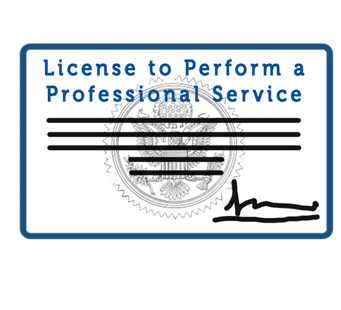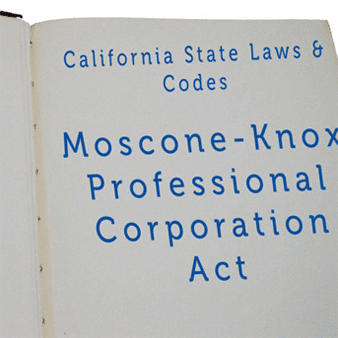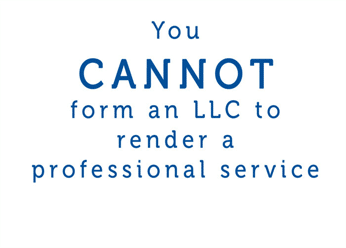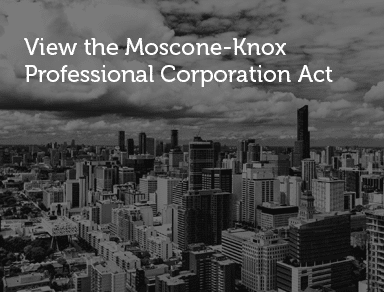More About Professional Corporations

How does a professional service form a business?
You have worked hard—you put in the schooling, the testing, the practice. Finally, you have received your license to practice in California, and you are ready to start your business! So, you start taking the steps to form a business entity.
Or maybe you are a business person who wants to invest in a corporation that will be operated by a professional. You don’t know how and don’t care to actually be a doctor, dentist, or lawyer—but you want to help run the business and grow it. You are ready to invest with a professional who does have the skills and license to form your own business entity in this field. Can you do it all? What are your options?
In either scenario, as you start to set up the business you will begin by considering different entity’ choices. You’ve heard of an LLC and an LLP, you’ve heard of an S-Corp and a C-Corp, but you’re not quite sure how and where a Professional Corporation fits into the picture. Whether you are practicing the profession or simply want to share in the ownership of such a business, understanding a professional corporation can be the difference between a wasted investment and failed business or a successful and legal corporation.

What Is a Professional Corporation?
A professional corporation is a corporation that provides professional services in a single profession and is organized under the General Corporation Law. In many instances, the rendering of their services is provided legally in accordance with a certificate of registration that is issued by the regulatory governmental agency for the profession. The practice or business of this profession under a certificate designates itself as a professional or other corporation.
Chiropractic is a good example. There are multiple steps to the process. If you want to practice chiropractic, you can’t just put an adjusting table in your garage and tell everyone from the neighborhood to come for an adjustment—legally anyway. What you need to do is go to Chiropractic School and sit through all the Chiropractic boards. And if you successfully pass the boards—you have to obtain a license to practice Chiropractic from the California Board of Chiropractic Examiners—the regulatory governmental agency for the profession. This is followed by forming a professional corporation and then applying for a Certificate of Registration from the Board.

So, what does Professional Services mean?
“Professional services” refers to any type of professional services that requires certification, license, or registration authorized by the Business and Professions Code, the Chiropractic Act, or the Osteopathic Act in order to be carried out legally.

What does a “Licensed Person” mean?
It means a person who is licensed under the provisions of the Business and Professions Code, the Chiropractic Act, or the Osteopathic Act to render the same professional services as will be rendered by the corporation of which they are, or intend to become, an officer, director, shareholder, or employee.

Does every professional have to obtain a Certificate of Registration from their Board in California?
Not necessarily. Professionals that are not required to obtain a certificate of registration to offer their professional services when operating a corporation are those licensed by the following boards:
- Medical Board of California or any examining committee under the jurisdiction of the board;
- Osteopathic Medical Board of California;
- Dental Board of California;
- Dental Hygiene Committee of California;
- California State Board of Pharmacy;
- Veterinary Medical Board;
- California Architects Board;
- Court Reporters Board of California;
- Board of Behavioral Sciences;
- Speech-Language Pathology and Audiology Board;
- Board of Registered Nursing; or the
- State Board of Optometry

Is there a specific California state law that deals with professional corporations in California?
Yes, there are quite a few but the main one is known as the “Moscone-Knox Professional Corporation Act.” It can be located in the California Corporation Code. Because there are many other laws that deal with professional corporations, working with a lawyer familiar with these laws is critical in making sure all your bases are covered.
Once you are licensed and want to form a corporation to practice/run your business—it cannot be a General Stock Corporation. In the state of California, professionals who wish to perform their professional services and do it using a business entity are REQUIRED to form a Professional Corporation.
Here is a list of the different types of Professional Corporations in California:
- Law Corporation
- Architecture Corporation
- Court Reporters Corporation
- Accounting Corporation
- Pharmacy Corporation
- Engineering Corporation
- Medical Corporation
- Podiatric Medical Corporation
- Psychological Corporation
- Speech-language Pathology Corporation
- Audiology Corporation
- Nursing Corporation
- Marriage and Family Therapist Corporation
- Licensed Clinical Social Worker Corporation
- Physician Assistants Corporation
- Optometric Corporation
- Chiropractic Corporation
- Acupuncture Corporation
- Naturopathic Doctor Corporation
- Dental Corporation
- Professional Clinical Counselor Corporation
- Physical Therapy Corporation
- Registered Dental Hygienist in Alternative Practice Corporation
- Clinical Counselor Corporation
- Midwifery Corporation
- Contractor Corporation

The Difference between an LLC and a PC (Professional Corporation)
Essentially, the difference between an LLC and a PC comes down to the laws: what are you allowed to form for your business?

Can I form a limited liability company for the purpose of rendering professional services?
This limitation is set out in the California Revised Uniform Limited Liability Company Act. In California Corporations Code 17701.04(e) it states:
“Nothing in this title shall be construed to permit a domestic or foreign limited liability company to render professional services, as defined in subdivision (a) of Section 13401 and in Section 13401.3, in this state.”
Similarly, you would be restricted in forming a general partnership to operate your professional business with a non-licensed individual.
As a licensed professional in California, you may organize your private practice either as a sole proprietorship, professional corporation, or a registered limited liability partnership.

Does a Professional Corporation protect my personal assets from malpractice?
Professional corporations do not provide a professional with malpractice liability protection for their own negligent acts, but they can protect the professional from liability for the negligence of other owners. Moreover, professional corporations also provide limited liability protection for certain other claims (e.g. if somebody is injured at your place of business).

What prevents me from forming a Professional Corporation?
The most obvious answer here is if you do not have a license or are not legally permitted to practice that profession. However, this question can also extend into ownership of a company. Only certain licensed individuals can own or be shareholders of a professional corporation, even if that individual is not performing any of the professional services. Check out this story about a client we had who was not aware of these specific requirements for professional corporations:

What if I don’t want to share ownership in my Professional Corporation, but rather I want to employ a related individual for the professional service (such as a medical professional)?
Even if you only want to employ an individual in your professional corporation, that individual needs to be licensed (as mentioned in Division 2 of the Business and Profession Code, the Chiropractic Act, or the Osteopathic Act) and you need to meet the requirements to form a Professional Corporation for them to render professional services.

I had a license before but have been disqualified. Am I still able to operate within the requirements for a Professional Corporation?
If you did have a license and then become a disqualified person, you are ineligible to remain as a shareholder, director, or officer of the Professional Corporation.
A “Disqualified Person” means a licensed person who for any reason becomes legally disqualified to render those professional services. This can be temporary or permanent and relates specifically to the particular professional that the corporation or foreign professional corporation of which the individual may be an owner, shareholder, or employee.

Forming a Professional Corporation: Limited to One Profession
When you form a Professional Corporation in California, you must state which specific profession your company/corporation will be practicing in the Articles of Incorporation. This will be stated as the purpose, in the following language:
The purpose of the corporation is to engage in the profession of [Description of Profession, e.g. Dentistry] and any other lawful activities (other than the banking or trust company business) not prohibited to a corporation engaging in such profession by applicable laws and regulations. This corporation is a professional corporation within the meaning of the California Corporations Code.
Part of the reason for this rule is that each profession has different requirements and restrictions. There is no ‘General’ Professional Corporation. Your company would be formed as a corporation specifically connected to one profession.

Are there exceptions to the single profession rule?
In order to increase success and revenue, your profession may naturally seek to form partnerships with other related professionals. A great example of this lies in the medical professions: a chiropractor may wish to share ownership with a medical doctor, or a medical doctor may want to work with physician assistants and registered nurses. However, if you are only allowed to reference one specialty, can you work with these individuals under your own corporation?
The answer is yes, under the correct circumstances. There are discreet and distinct lists, available for each Professional Corporation, which sets forth who may also be shareholders or owners of that corporation.
For example, if a medical doctor wishes to form a medical corporation with other related medical professionals, that medical doctor may share ownership in the medical corporation with the following shortlist of related medical providers:
- (1) Licensed doctors of podiatric medicine.
- (2) Licensed psychologists.
- (3) Registered nurses.
- (4) Licensed optometrists.
- (5) Licensed marriage and family therapists.
- (6) Licensed clinical social workers.
- (7) Licensed physician assistants.
- (8) Licensed chiropractors.
- (9) Licensed acupuncturists.
- (10) Naturopathic doctors.
- (11) Licensed professional clinical counselors.
- (12) Licensed physical therapists.
- (13) Licensed pharmacists.
Getting Started on Your Business: Fulfill All the Requirements to Correctly Form a Professional Corporation in California with Incorporation Attorney
With all the distinct and specific laws that revolve around your professional service and forming a professional corporation, you need an attorney who specializes not just in Professional Corporations but in your type of service!
Work with us to form your specific professional corporation. Contact us today for advice on how to form your specific professional corporation or other legal questions relating to your professional corporation.
Are there specific name requirements for professional corporations?
Yes! Please check out your corporation below to know more about naming your professional corporation





































